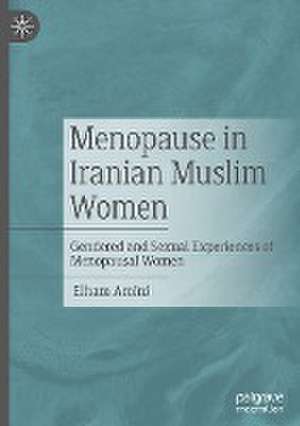Menopause in Iranian Muslim Women: Gendered and Sexual Experiences of Menopausal Women
Autor Elham Aminien Limba Engleză Hardback – 30 noi 2023
Preț: 716.14 lei
Preț vechi: 873.35 lei
-18% Nou
Puncte Express: 1074
Preț estimativ în valută:
137.10€ • 140.100$ • 113.74£
137.10€ • 140.100$ • 113.74£
Carte tipărită la comandă
Livrare economică 20 februarie-06 martie
Preluare comenzi: 021 569.72.76
Specificații
ISBN-13: 9783031447129
ISBN-10: 3031447123
Pagini: 247
Ilustrații: XV, 247 p. 2 illus.
Dimensiuni: 148 x 210 mm
Greutate: 0.47 kg
Ediția:1st ed. 2023
Editura: Springer International Publishing
Colecția Palgrave Macmillan
Locul publicării:Cham, Switzerland
ISBN-10: 3031447123
Pagini: 247
Ilustrații: XV, 247 p. 2 illus.
Dimensiuni: 148 x 210 mm
Greutate: 0.47 kg
Ediția:1st ed. 2023
Editura: Springer International Publishing
Colecția Palgrave Macmillan
Locul publicării:Cham, Switzerland
Cuprins
1 Setting the Scene.- 1.1 Introduction.- 1.2 This Research.- 1.3 Research Practice, Process and Procedure.- 1.4 A Note on Terminology.- 1.4.1 Menopause.- 1.4.2 Religious.- 1.5 Summary and Structure of the Book.- References.- 2 Life Course Approach & Understanding Body, Gender, and Sexuality.- 2.1 Introduction.- 2.2 Biographical Life Course.- 2.2.1 Life Course as a Concept.- 2.2.2 Pertinence of the Life Course: Viewing Menopause as a Turning Point.- 2.3 Exploring Theoretical Positions on Gender, Sexuality, the Body and Menopause.- 2.3.1 Patriarchy and Walby’s Approach.- 2.3.2 Hegemony, Gender and the Gender Order.- 2.3.3 Pertinence of Connell’s Gender Order Concept.- 2.4 Embodiment.- 2.4.1 Introduction.- 2.4.2 Notion of Body in Social Sciences.- 2.4.3 Perspectives toward Body and Reflexive Embodiment Techniques.- 2.4.4 Pertinence of Crossley’s Reflexive Body Techniques Concept.- 2.5 Biographical Research Approach.- 2.5.1 Why Biographical Research?.- 2.5.2 Biography as a Source of Authentic Data.- 2.6 Gender Order, Reflexive Body Techniques and Biographical Life course: Integration.- 2.6.1 Connell’s Gender Order and Reflexive Body Techniques.- 2.6.2 Connell’s Gender Order and Biographical Life Course Approach.- 2.6.3 Biographical Life Course Approach and Reflexive Embodiment.- 2.7 Conclusion and Summary.- References.- 3 Childhood.- 3.1 Introduction.- 3.2 Gender Discovery: When Family Didn’t Want Me to be a Girl: Gender Discovery.- 3.2.1 Gender Discovery through Gender Discrimination.- 3.2.2 Gender Discovery through Sexual Awareness and Family Strategy.- 3.2.3 Gender Discovery through Physical Differences.- 3.3 Extra Things That Kept Growing and I Felt Shame: Puberty.- 3.3.1 Growing Breasts.- 3.3.2 Menstruation and Menarche.- 3.3.3 Family Management of Sexuality Signs.- 3.4 Bloody Napkin or Virginity Test: Virginity Proof System.- 3.5 ‘A Girl’ and a ‘Good Girl’.- 3.6 Conclusion.- References.- 4 Womanhood.- 4.1 Introduction.- 4.2 Entering Womanhood.- 4.2.1 Goes WithWhite Dress, Returns with White Dress: Marriage.- 4.2.2 Just Keep Quiet and Be Still and Motionless: First Sexual Experiences.- 4.3 Participating Womanhood.- 4.3.1 Sex as a Joy or a Duty and Sacrifice.- 4.3.2 A Good Wife Must be a Good Wife: Domestic Labor and Requirement for being a Good Wife.- 4.4 Conclusion.- References.- 5 Menopausal Time.- 5.1 Introduction.- 5.2 It Was Too Early for Me: Disclosure of Diagnosis: Onset and Timing of Menopause.- 5.2.1 Menopausal Signs and Onset of Menopause.- 5.3 Understanding Menopause.- 5.3.1 Resources for Understanding Menopause.- 5.3.2 Menopause as a Source of Illness and Depression and as a Time for Re-evaluating Life.- 5.3.3 Menopause as a Sign of Being Old.- 5.3.4 Menopause as a Death Reminder.- 5.3.5 Menopause as a Body Reminder.- 5.4 This Puffiness around My Eyes: Body Image and Cosmetic Surgery.- 5.5 Now, I Can Say NO to My Husband: Sexual Experience.- 5.6 The Impact of Medical Discourse.- 5.7 Loss Narratives: Narratives of Resistance.- 5.8 Conclusion.- References.- 6 Conclusion.- 6.1 Introduction.- 6.2 Childhood.- 6.3 Womanhood.- 6.4 Menopausal Time.- 6.5 Summary.- References.
Notă biografică
Elham Amini is a Lecturer in Sociology at the University of Liverpool, UK. Her work focuses on the gendered and sexual experiences of menopausal women, and her research interests include medical sociology, ageing, sexualities, and women's health.
Textul de pe ultima copertă
This book offers an original empirical study into the gendered and sexual experiences of Iranian Muslim women going through menopause. Using a biographical lifecourse lens, it explores the processes through which these experiences are shaped by hegemonic gender norms, as well as how these women express their agency. Centering the voices of Iranian Muslim women, this book links sexuality, ageing, and the body to the matter of menopause, conceived here as a gendered, embodied and lived phenomenon characterised both by cultural constraint and by individual reflexive body techniques. By considering gender and sexuality as vectors of power with internal politics, inequalities, and oppression alongside embodied practice, the author shows how the life course provides a trajectory of sex and sexuality that routes both in time, space, social and cultural context.
Elham Amini is a Lecturer in Sociology at the University of Liverpool, UK. Her work focuses on the gendered and sexual experiences of menopausal women, and her research interests include medical sociology, ageing, sexualities, and women's health.
Caracteristici
brings together gender and sexuality studies in the Middle East with aging studies analyzes narrative life stories of Iranian Muslim women turns away from biomedical frameworks to considers the social, political, and cultural dimensions of menopause
